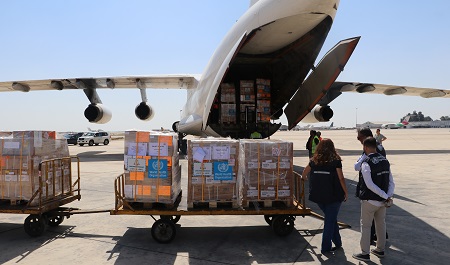 Responding to the cholera outbreak in Syria, WHO delivered a 60-tonne shipment of cholera kits, oral rehydration solutions, rapid diagnostic tests, and medical supplies for intravenous (IV) rehydration treatment, in addition to chlorine for water purification4 October 2022, Damascus – Funding from Norway has enabled WHO to immediately respond to the cholera outbreak declared by the Syrian Ministry of Health on 10 September 2022 and ensure the delivery of supplies for thousands of people who are infected or at risk.
Responding to the cholera outbreak in Syria, WHO delivered a 60-tonne shipment of cholera kits, oral rehydration solutions, rapid diagnostic tests, and medical supplies for intravenous (IV) rehydration treatment, in addition to chlorine for water purification4 October 2022, Damascus – Funding from Norway has enabled WHO to immediately respond to the cholera outbreak declared by the Syrian Ministry of Health on 10 September 2022 and ensure the delivery of supplies for thousands of people who are infected or at risk.
“Syria’s health system has been repeatedly strained through multiple concurrent emergencies and challenges that continue to affect the availability and quality of health services across the country. More than half of the health facilities in Syria remain partially functional or destroyed,” said Dr Iman Shankiti, WHO Representative in Syria. “This support from Norway is a critical contribution to WHO's work and plays a key role in strengthening our response to the current outbreak while addressing wider health needs,” Dr Shankiti added.
Using flexible funds from Norway that allow WHO to meet the urgent needs as they arise, WHO was able to procure the needed life-saving treatments from the local market in the first days of the cholera outbreak and deliver a 60-tonne shipment of cholera kits, oral rehydration solutions, rapid diagnostic tests, and medical supplies for intravenous (IV) rehydration treatment, in addition to chlorine for water purification.
The shipments, airlifted from WHO’s logistics hub in Dubai, will enable health authorities and partners to provide treatment for 2000 severe cholera cases and almost 190 000 cases of diarrhoea with mild symptoms. In Aleppo governorate, WHO distributed more than 250 000 chlorine tablets, and trained around 100 health care workers on surveillance, infection, prevention and control measures, as well as case management. WHO is also working on expanding the capacity of cholera treatment units by delivering 30 patient beds and needed accessories.
After a decade of zero cholera cases in Syria, on 1 October 2022, the Ministry of Health reported a cholera outbreak in 11 governorates (Aleppo, Hassakeh, Deir Ez-Zor, Ar-Raqqa-Latakia, Homs, Hama, As-Sweida, Daraa, Qunitera, and Damascus) with a total of 36 deaths and 524 confirmed cases.
The situation is evolving alarmingly in affected governorates and expanding to new areas. WHO is following up closely with all health partners to contain the outbreak and prevent further spread of infection through enhancing cholera surveillance in high-risk areas at health facilities and community levels, promoting community awareness, including access to sanitation and personal hygiene practices, providing chlorination for drinking-water sources, securing rapid diagnostic tests, and providing needed treatments.
Norway has been a long-standing partner of WHO, continuously working to strengthen emergency response activities to meet the needs of the most vulnerable populations in Syria.








